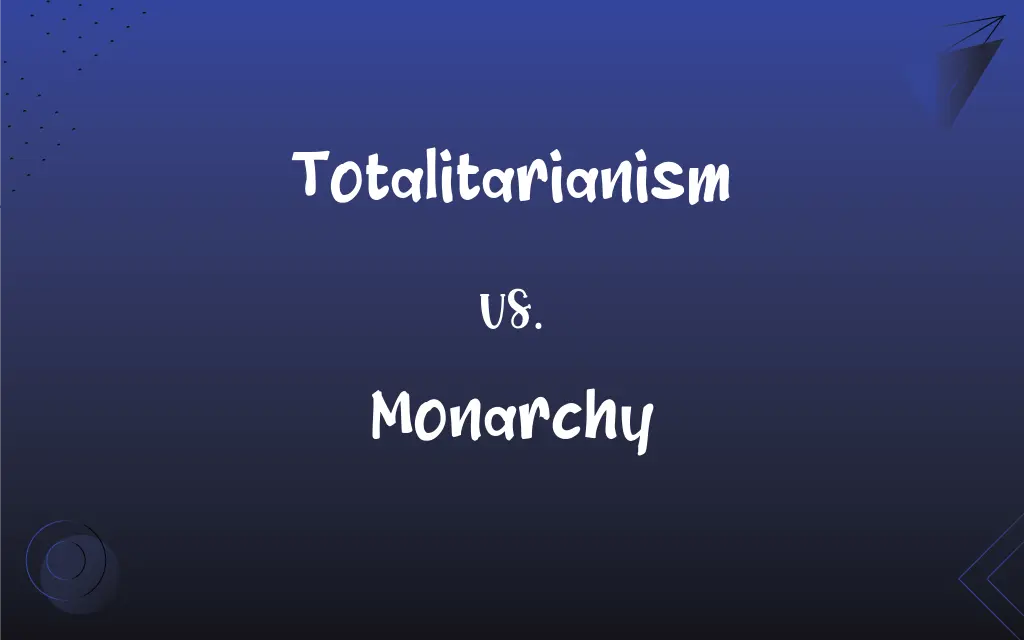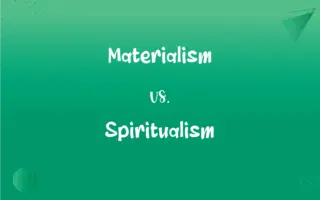Totalitarianism vs. Monarchy: What's the Difference?
Edited by Janet White || By Harlon Moss || Updated on November 30, 2023
Totalitarianism is a political system where the state holds absolute power over society and controls all aspects of public and private life. Monarchy is a form of government where a monarch (king, queen, emperor) is the head of state, often hereditary.

Key Differences
Totalitarianism is characterized by the concentration of power in a single authority, often led by a dictator, with the state seeking to control every aspect of public and private life. In contrast, a monarchy is a form of government where a monarch, usually a king or queen, holds supreme authority, which is often inherited and may vary in power from ceremonial to absolute.
In totalitarian regimes, the government maintains strict control over the economy, media, and education, aiming for complete subservience to the state ideology. Monarchies, on the other hand, can range from absolute, where the monarch has complete control, to constitutional, where their role is largely symbolic and power is shared with elected bodies.
The key difference lies in the scope of control: totalitarianism seeks to infiltrate and regulate every aspect of societal life, often suppressing dissent and political opposition. Monarchies, depending on their form, might allow varying degrees of political freedom and public participation in governance.
Totalitarian states often emerge from revolutionary movements or radical ideologies, whereas monarchies are usually established through historical and hereditary succession, with some evolving into constitutional forms that limit the monarch’s power.
Totalitarianism is inherently oppressive, seeking uniformity and obedience, while monarchies can offer stability and continuity but may also become autocratic if unchecked, especially in absolute monarchies.
ADVERTISEMENT
Comparison Chart
Nature of Power
Absolute, centralized in one party or leader
Hereditary, vested in a monarch
Political Freedom
Severely limited or non-existent
Varies from absolute to constitutional
Role of Ideology
Central, often involving a cult of personality
Less ideologically driven
Change in Leadership
Often through revolution or coup
Usually hereditary or by succession
Public Participation
Generally suppressed and controlled
Varies, often more in constitutional monarchies
ADVERTISEMENT
Totalitarianism and Monarchy Definitions
Totalitarianism
Totalitarianism is a system where the state holds total authority over society and seeks to control all aspects of public and private life.
In the totalitarian regime, media censorship was pervasive and dissent was not tolerated.
Monarchy
Constitutional monarchy is a form of government where the monarch's powers are limited by a constitution, often ceremonial.
Despite being a monarchy, the king's role was largely symbolic, with real power resting with elected officials.
Totalitarianism
Totalitarianism often entails the use of propaganda and surveillance to maintain control.
In that totalitarian state, surveillance was omnipresent, ensuring compliance with the regime’s policies.
Monarchy
Monarchy is a form of government with a monarch at the head, usually a king or queen, who often holds power for life.
The monarchy was revered in the country, with the queen playing a significant role in national ceremonies.
Totalitarianism
In totalitarianism, political power is concentrated in the hands of a few, often disregarding traditional social orders.
Under totalitarianism, the government imposed strict regulations on every aspect of daily life.
Monarchy
Absolute monarchy is a form where the monarch has unrestricted power over the government and its people.
In the absolute monarchy, the king made decisions without parliamentary consent or constitutional constraints.
Totalitarianism
Totalitarianism is characterized by the absence of democratic processes and the prevalence of arbitrary rule.
The totalitarian government abolished free elections and curtailed civil liberties.
Monarchy
Monarchy can sometimes function as a stabilizing factor, providing continuity and tradition in governance.
The monarchy has been a unifying symbol for the nation, embodying centuries of history and tradition.
Totalitarianism
Totalitarianism involves centralized control by an autocratic authority, often a dictator.
The country's descent into totalitarianism was marked by the rise of a single-party rule.
Monarchy
Monarchy often involves the hereditary transmission of authority, passing from one generation of the royal family to the next.
In the monarchy, the prince was next in line to the throne, following centuries-old traditions.
Totalitarianism
Of, relating to, being, or imposing a form of government in which the political authority exercises absolute and centralized control over all aspects of life, the individual is subordinated to the state, and opposing political and cultural expression is suppressed
"A totalitarian regime crushes all autonomous institutions in its drive to seize the human soul" (Arthur M. Schlesinger, Jr.).
Monarchy
Government by a monarch.
Totalitarianism
A practitioner or supporter of such a government.
Monarchy
A state ruled or headed by a monarch.
Totalitarianism
A system of government in which the people have virtually no authority and the state wields absolute control, for example, a dictatorship.
Monarchy
A government in which sovereignty is embodied within a single, today usually hereditary head of state (whether as a figurehead or as a powerful ruler).
An absolute monarchy is a monarchy where the monarch is legally the ultimate authority in all temporal matters.
A constitutional monarchy is a monarchy in which the monarch's power is legally constrained, ranging from where minor concessions have been made to appease certain factions to where the monarch is a figurehead with all real power in the hands of a legislative body.
Totalitarianism
A form of government in which the ruler is an absolute dictator (not restricted by a constitution or laws or opposition etc.)
Monarchy
The territory ruled over by a monarch; a kingdom.
Totalitarianism
The principle of complete and unrestricted power in government
Monarchy
A form of government where sovereignty is embodied by a single ruler in a state and his high aristocracy representing their separate divided lands within the state and their low aristocracy representing their separate divided fiefs.
Monarchy
States based on a system of governance headed by a king or a queen.
Monarchy
A state or government in which the supreme power is lodged in the hands of a monarch.
Monarchy
A system of government in which the chief ruler is a monarch.
In those days he had affected zeal for monarchy.
Monarchy
The territory ruled over by a monarch; a kingdom.
What scourage for perjuryCan this dark monarchy afford false Clarence.
Monarchy
An autocracy governed by a monarch who usually inherits the authority
FAQs
What is totalitarianism?
Totalitarianism is a political system where the state has absolute power and controls all aspects of both public and private life.
What is a monarchy?
A monarchy is a form of government with a monarch (king, queen, or emperor) as the head of state, often with power passed down hereditarily.
Can monarchies have constitutions?
Yes, many modern monarchies are constitutional, with the monarch's powers limited by a constitution.
What is a key feature of totalitarian regimes?
Centralized control and suppression of political dissent are key features of totalitarian regimes.
Do totalitarian governments allow free elections?
No, totalitarian governments typically suppress political opposition and do not allow free and fair elections.
What role does censorship play in totalitarianism?
Censorship is crucial in totalitarian states to control information and prevent dissent.
How does totalitarianism differ from a monarchy?
Totalitarianism is characterized by absolute control by a state or leader, often oppressive, whereas a monarchy's power can range from ceremonial to absolute, typically hereditary.
Can a monarchy be democratic?
Yes, in a constitutional monarchy, the monarch's role is often ceremonial with real power lying in a democratically elected government.
Is totalitarianism always led by a dictator?
Often, but not always. Totalitarianism is defined more by the absolute control of the state over all aspects of life than by the presence of a dictator.
What is the difference between absolute and constitutional monarchies?
In absolute monarchies, the monarch has complete control, while in constitutional monarchies, their powers are limited and largely symbolic.
Do totalitarian regimes have a single party system?
Often, totalitarian regimes are characterized by a single-party system where one party controls the state apparatus.
Are all monarchies hereditary?
Most are, but there are exceptions where the monarch is selected by other means, like election or appointment.
How does succession work in non-hereditary monarchies?
In non-hereditary monarchies, succession may be determined by election or appointment by a governing body.
Can a monarchy evolve over time?
Yes, many monarchies have evolved, with some transitioning to constitutional forms that limit the monarch’s power.
How does propaganda play a role in totalitarianism?
Propaganda is used in totalitarian states to control public opinion and reinforce the state's ideology.
How is power transferred in a monarchy?
Power is usually transferred hereditarily within a royal family, though some monarchies have succession laws.
Can totalitarian states have different political ideologies?
Yes, totalitarian states can be founded on various ideologies, including communism, fascism, or religious fundamentalism.
Can a monarchy be part of a republic?
Generally no, as monarchies and republics are usually distinct forms of government, but ceremonial monarchies can exist within a parliamentary system.
What role does the public play in a constitutional monarchy?
In a constitutional monarchy, the public typically participates in governance through elected representatives.
Are all totalitarian regimes militaristic?
Many are, but militarism is not a defining feature of totalitarianism.
About Author
Written by
Harlon MossHarlon is a seasoned quality moderator and accomplished content writer for Difference Wiki. An alumnus of the prestigious University of California, he earned his degree in Computer Science. Leveraging his academic background, Harlon brings a meticulous and informed perspective to his work, ensuring content accuracy and excellence.
Edited by
Janet WhiteJanet White has been an esteemed writer and blogger for Difference Wiki. Holding a Master's degree in Science and Medical Journalism from the prestigious Boston University, she has consistently demonstrated her expertise and passion for her field. When she's not immersed in her work, Janet relishes her time exercising, delving into a good book, and cherishing moments with friends and family.































































